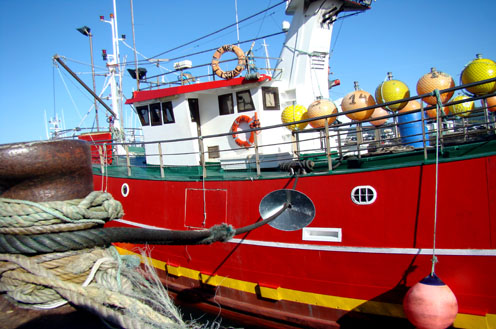Spain and Portugal renew the bilateral fisheries agreement for the management of fishery resources in waters bordering the two countries
News - 2021.6.28
Luis Planas and the Portuguese Minister for the Sea, Ricardo Serrao Santos, signed the renewal of the fisheries agreement in Luxembourg that will govern the fishing conditions of Spanish and Portuguese fleets in the waters bordering the two countries.
Luis Planas underlined the importance of this agreement that "gives continuity to the one signed in 1986", and stressed that "it will improve fisheries management and give stability to fishing vessels of both countries".
Among the main aspects of this agreement, which is valid for five years - and extendable for a further two - is that each country's trawlers must respect the timetables established for trawling in the waters of the other country. For trawl fishing that may be carried out at weekends, catches may only be landed in the ports of the other country from 00:00 hours on Tuesday. This measure responds to one of the demands made by the Spanish fleet, which is obliged by national regulations to stop at weekends, unlike the Portuguese fleet, which is not prohibited from doing so.
It also includes authorisation to land in Spanish and Portuguese ports, irrespective of where the first sale will subsequently take place. Vessels shall pay the fees of the country of landing and accompany the catches with a transport document to the place of first sale.
Among other aspects, technical measures are included, such as the prohibition bottom trawls with rollers and rockhoppers in Spanish waters; the harmonisation of management measures, such as the biological closure for trawling in autumn in the Gulf of Cadiz; the maintenance of the main fishing opportunities regarding the number of licences established for both fleets, both in continental waters and in those of the Miño and Guadiana border agreements. In addition, the coordination and exchange of information between the two parties to monitor the fleets' fishing activities in each other's waters will be strengthened.
These measures respond to the demands of the Spanish sector, especially the trawl fleet of the Cantabrian North West and the coastal and trawl fleets of the Gulf of Cadiz, which had been asking for a stable and lasting agreement on equal conditions with the neighbouring country's fleet.
This agreement demonstrates the harmony between the two countries in the management of shared fisheries resources and the commitment to sustainable and responsible fisheries management. Once signed, the text will have to be ratified by the parliaments of both countries for its subsequent entry into force, scheduled for 1 January 2022.
Non official translation





